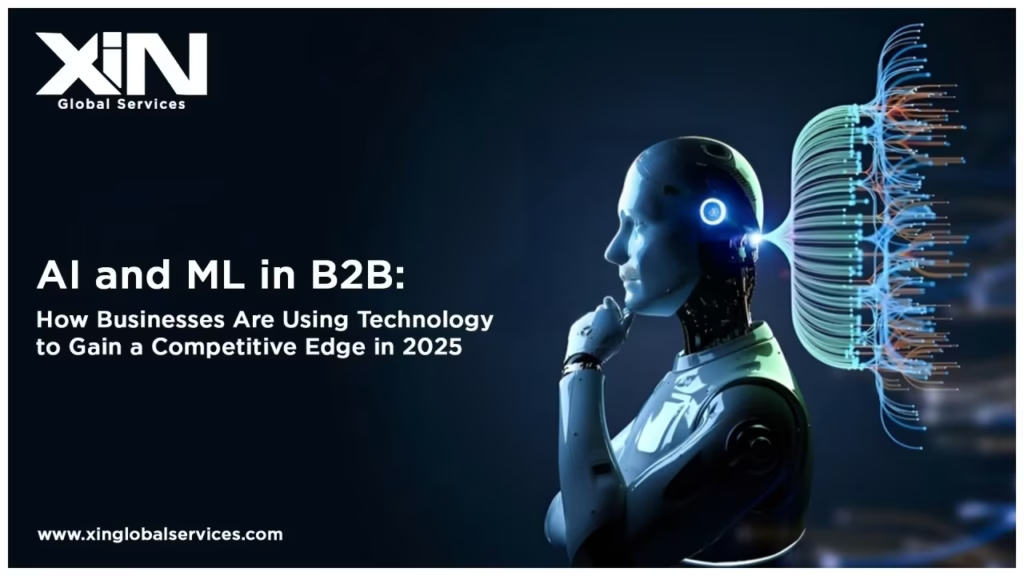In 2025, artificial intelligence (AI) and machine learning (ML) will reshape the B2B sector by enhancing efficiency, optimizing processes, and opening new revenue streams. These technologies are no longer futuristic but essential to modern business strategies, decision-making, and customer engagement. Companies that effectively adopt AI and ML are poised to outperform competitors.
This article delves into how AI and ML are revolutionizing B2B operations and fostering competitive advantages in 2025. Visit www.xinglobalservices.com to learn more about our AI and ML-related services in B2B
1. Elevating Customer Experience Through AI-driven Personalization
Customer experience (CX) is a key differentiator in B2B markets. AI-driven personalization enables companies to tailor interactions using historical data and behavioral insights.
- Predictive analytics anticipates customer needs, enabling relevant recommendations and tailored solutions.
- Conversational AI tools, including chatbots and virtual assistants, offer round-the-clock support and enhance engagement.
- Sentiment analysis assesses customer satisfaction, allowing businesses to address concerns proactively.
2. Optimizing Sales and Marketing with AI
AI and ML are transforming sales and marketing strategies by improving audience targeting and lead conversion.
- AI-based Lead Scoring: Machine learning identifies high-potential leads, enabling sales teams to prioritize the most promising prospects.
- Predictive Marketing: AI assesses customer behavior to anticipate purchasing trends, allowing businesses to refine their campaigns.
- Automated Content Creation: AI-generated content ensures messaging aligns with customer preferences, enhancing engagement.
- Dynamic Pricing Models: AI-driven pricing strategies adjust in real-time based on demand, competition, and buying behavior, ensuring competitiveness.
3. Streamlining Supply Chain and Logistics with AI
Supply chain disruptions remain a significant challenge for B2B enterprises. AI-driven tools optimize logistics, reduce costs, and enhance efficiency.
- Demand Prediction: AI analyzes historical data to forecast market demand and prevent stock imbalances.
- Real-time Route Optimization: AI-powered logistics solutions enhance delivery efficiency by optimizing routes and minimizing delays.
- Automated Inventory Control: Machine learning tracks stock levels and triggers timely restocking alerts.
- Supplier Risk Assessment: AI identifies potential supply chain risks, allowing businesses to implement preventive measures.
4. Empowering Decision-making with AI-driven Business Intelligence
Data-driven decision-making is crucial in B2B. AI-powered business intelligence tools transform raw data into actionable insights.
- Advanced Analytics: ML algorithms extract meaningful trends from complex datasets, informing strategic decisions.
- Real-time Reporting: AI-driven dashboards present insights in a digestible format, enabling swift decision-making.
- Fraud Prevention: AI detects anomalies in transactions, safeguarding against fraud and ensuring compliance.
- Automated Financial Projections: AI models forecast revenue trends, aiding businesses in long-term planning.
5. Hyperautomation: AI and ML in Business Process Automation
Hyperautomation, which combines AI, ML, and robotic process automation (RPA), is revolutionizing business operations.
- AI-driven Task Automation: Routine processes like data entry and invoice management are automated, reducing errors and improving productivity.
- AI-powered HR Solutions: AI enhances recruitment by screening candidate profiles and conducting preliminary interviews.
- Smart Contract Management: AI streamlines contract creation, compliance monitoring, and risk assessment.
- AI-enhanced cybersecurity: ML-based security solutions identify and respond to cyber threats in real-time, protecting sensitive data.
6. The Future of AI and ML in B2B: What lies Ahead?
As AI and ML continue evolving, their applications in B2B will expand further. Key trends to watch include:
Ethical AI Implementation: Companies will prioritize ethical AI practices and regulatory compliance to address concerns about bias and data privacy.
AI-driven Product Development: Businesses will leverage AI to design innovative products tailored to customer needs.
AI-assisted Decision-making: AI will help executives navigate complex decisions with greater accuracy.
AI-powered Collaboration Platforms: AI will enhance remote teamwork and project management in global B2B operations.
Conclusion
In 2025, AI and ML will be indispensable for B2B companies aiming to stay competitive. Organizations leveraging AI for insights, automation, and data analysis will benefit from enhanced efficiency, superior customer experiences, and stronger market positioning.
As AI advances, businesses that embrace continuous innovation will thrive in an increasingly competitive environment. Success lies in strategic AI integration and adapting to emerging trends.
Now is the time for B2B enterprises to harness AI and ML to redefine industry standards and drive future growth.




